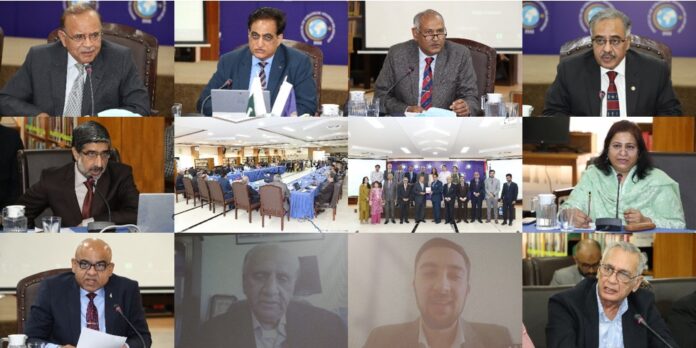- Advertisement -
ISLAMABAD, Apr 23 (APP): The Arms Control and Disarmament Centre (ACDC) at the Institute of Strategic Studies Islamabad (ISSI), in collaboration with the Indian Ocean Study Centre (IOSC) of the National Institute of Maritime Affairs (NIMA), Islamabad, organized a seminar on “Role of Technology and Pakistan’s Maritime Security.”
The chief guest on the occasion was Admiral Noman Bashir, former Chief of Naval Staff, other speakers included Rear Admiral Javid Iqbal HI(M), Deputy President National Defence University; Mr. Ammar Jaffri, former DG FIA; Mr. Zafar Iqbal, Member SUPARCO; Dr. Zunera Jalil, Professor, Department of Cyber Security, Air University; Mr. Halil Ibrahim Akcan, Researcher, National Centre for the Sea and Maritime Law, Ankara University; Vice Admiral, Ahmad Saeed HI(M) (Retd.), President NIMA; and Ambassador Sohail Mahmood, Director General ISSI, said a press release.
The chief guest, Admiral Noman Bashir, emphasized the rapid pace of technological development, drawing on his extensive experience in the Pakistan Navy. He illustrated how naval communications have evolved from physically sending a ship for instructions to near real-time information exchange, noting that technology has compressed time.
However, he cautioned that technology is a tool, not the ultimate decision-maker, stating that while machines can recommend, humans will always have the final say. He also pointed out the high cost of technology throughout history, from the Napoleonic Wars to the present day.
Furthermore, he raised logistical challenges in the maritime domain, questioning the consistent reliability of technology, even in modern warships. His recommendations included keeping pace with technology through indigenization, optimizing tactics, and maximizing the utilization of available resources.
Earlier, in his welcome remarks, DG ISSI Ambassador Sohail Mahmood stated that emerging technologies like AI, cybersecurity, and space capabilities are significantly reshaping maritime security, presenting both opportunities and challenges for Pakistan. AI offers transformative potential for maritime surveillance, threat detection of activities like smuggling, illegal fishing, and predictive analytics, enhancing real-time decision-making and resource preservation. Robust cybersecurity frameworks are critical to protect Pakistan’s maritime infrastructure from growing cyber threats.
Space capabilities are indispensable for real-time surveillance, secure communication, precise navigation, and environmental monitoring, strengthening Pakistan’s ability to manage its maritime domain. The growth of Pakistan’s maritime infrastructure, particularly Karachi and Gwadar ports, was vital to CPEC, necessitating the adoption of cutting-edge networks and technologies like AI, with the Navy playing a leading role.
Malik Qasim Mustafa, Director ACDC, in his introductory remarks, said that in order to fully tap its maritime potential, Pakistan must effectively invest in Maritime Domain Awareness (MDA) systems, coastal radars, drone surveillance, and the latest AI-enhanced technologies in its maritime operations.
Rear Admiral Javaid Iqbal, talking on “The Geopolitics of Emerging Technologies in the Maritime Domain,” emphasized that maritime activity under the blue economy was expected to triple by 2050. However, this growth was coming amid increasing disruptions. Ports are becoming smart, with robots managing operations and unarmed vessels using GPS for navigation. This marks the dawn of a new era in maritime affairs that is technologically driven but expensive, limiting full participation to a few advanced nations. He stressed a growing need to shift focus from traditional maritime operations to cyber-maritime security.
Mr. Ammar Jaffri reinforced the idea that AI is set to uncover and shape every layer of maritime security. With the rise of cyber psychology, attention must be paid to how individuals react to and manage threats in digital maritime domains. He emphasized that AI thrives on data collected via satellites and drones. He proposed key focus areas, including drone, satellite data, and machine learning to detect anomalies in ship behavior, and the deployment of unmanned surface vehicles to help with threat identification and obstacle avoidance.
Mr. Zafar Iqbal highlighted how space assets act as force multipliers for maritime security. Technologies such as remote sensing, satellite communications, weather tracking, and China Navigation Satellite Systems (CNSS) are now integral to modern maritime surveillance. Pakistan’s space capabilities are vital for ISR and socioeconomic development. Satellites can increase sea situational awareness, cover EEZ, including monitoring international shipping routes.
Dr. Zunera Jalil highlighted that cyberattacks are a major threat to cargo ships and harbor systems. She stated that while AI can be deployed for attack detection and securing systems, adversaries are also using AI, including generative AI systems, to launch sophisticated attacks (Gams). Ransomware attacks are currently the number one cyber threat in the maritime sector, causing significant financial and reputational losses. She raised critical questions about the preparedness of maritime operations for cyberattacks, including zero-day attacks (newly created attacks with no known defenses).
Mr. Halil Ibrahim Akcan said that there is rapid development and deployment of autonomous maritime technologies, as seen in projects like Norway’s Yara Birkeland and Ukraine’s sea drones, which are outpacing current legal frameworks. AI is propelling maritime operations into genuinely uncharted waters, yet the law of the sea has navigated every leap from sail to steam to nuclear propulsion.
Vice Admiral Ahmed Saeed stated that technology is now a strategic imperative for maintaining superiority, particularly in military and maritime operations, which are being rapidly transformed by AI, cyber capabilities, and quantum computing.
He stressed the importance of balancing technological advancements with ethical, legal, and operational accountability. He concluded that strategically incorporating technology across the maritime domain will enable Pakistan to safeguard its national security and accelerate its Blue Economy.
The seminar was attended by a cross-section of people including diplomats, practitioners academics, think tank experts, student and members of the media.

